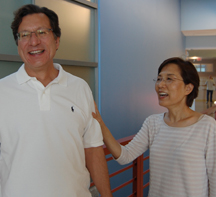Married to Science
By Eric Sauter
When Hyeryun Choe and Mike Farzan first met at Harvard some 20 years ago, it was in a laboratory that, as Farzan remembers, was so small they were "either going to kill each other or fall in love."
Fortunately for everyone at Scripps Florida, it was the latter.
Now, both Farzan and Choe are scientists on The Scripps Research Institute’s (TSRI) Jupiter campus—they arrived in 2012—and both study the inner workings of various viruses in the Department of Immunology and Microbial Science, specifically how these viruses make their initial entry into the cell.
They aren't the only married couple to take up scientific residence at Scripps Florida—only the latest.
Being married scientists has its advantages, Choe said. Among other things, it makes conversation easy.
"It's very convenient for us because, even though I haven't really calculated it, I think one-third of conversation is still about our work—it used to be more," she said. "The fact that we can talk about it freely without worrying about the other person not understanding is really good. Other people say you should never marry a person with the same profession, but it worked out wonderfully for us."
There's a lot to talk about, too. Her laboratory recently received a $2.3 million grant from the National Institutes of Health to study a category of viruses that cause dengue fever, West Nile, yellow fever and other diseases spread by mosquitoes and ticks. These diseases can result in flulike symptoms, extreme pain (dengue has been called "bone-break fever") and, in some cases, encephalitis.
This is especially relevant in Florida, where the outbreak of dengue fever that infected some 20 people in Florida's Martin County late last year unnerved many who feared the tropical disease had once again established a foothold in Florida. The last outbreaks occurred in 2009 and 2010 in Key West—before that, the disease hadn't struck Florida in more than 70 years.
"The virus uses a very clever method of infection," Choe said. "It's like using a side door to enter a house when the front door is locked."
While Farzan is interested in viral invasion, his focus has been on other viruses that have also made the news—Ebola and HIV. He was one of several scientists from Scripps Florida who received more than $1 million in National Institutes of Health funding to research inhibitors that block the entry of the Ebola virus. The team, which includes researchers at the University of California, San Francisco, is now looking for approval to conduct animal testing. They hope to develop drugs that could be used to vaccinate those at risk or treat those with symptoms.
"We have limited funding, but we have made really good progress," Farzan said. "I'm told this is going in NIH's fast-track mechanism, so we're hoping to hear something in the not too distant future."
Farzan recently had a study on another well-known virus—HIV—published by the prestigious journal Nature. The study, which, research-wise, was nearly a decade in the making, made a splash when it showed the team’s drug candidate could block every strain of HIV-1, HIV-2 and SIV (simian immunodeficiency virus) that has been isolated from humans or rhesus macaques, including the hardest-to-stop variants. (See “Scientists Announce Anti-HIV Agent So Powerful It Can Work in a Vaccine”)
Farzan finds being married to a scientific equal a blessing as well.
"Scientifically, it's as good as it gets because you're married to the collaborator that you trust the most," he said. "Sometimes it seeps into the marriage half of life—and sometimes work creeps too much into life. But on balance I would call it a good thing. It's no question that it helps the marriage—it strengthens it because you're with somebody who knows all aspects of you."
Having settled into a condo on the beach in Juno Beach, both are glad to be at Scripps Florida—and in Florida.
They walk on the beach—Choe admits that Farzan does it more than she does—and that she was a little worried about how hot it would be when they finally settled into the Sunshine State.
"I thought it would be too hot and too humid," she said, "but we adapted to it so fast and now we can't live anywhere else. It's so funny that I worried about the weather."
For more information, see the Choe and Farzan biosketch pages.
Send comments to: press[at]scripps.edu














